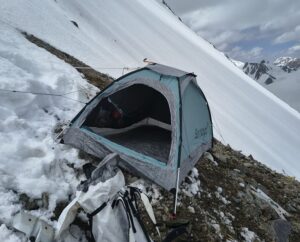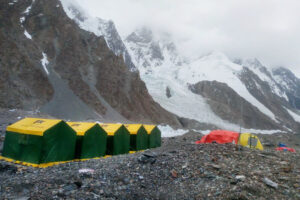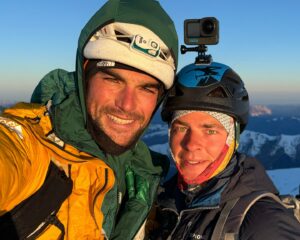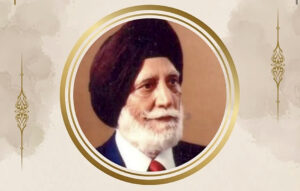The Nepalis are not yet done with K2! In a surprise move, Pasang Norbu Sherpa has set off on a speed record attempt. He set off from Base Camp at 6 am local time and reached higher Camp 2 (6,670m) seven hours later.
According to expedition leader Dawa Sherpa, Norbu’s goal is to climb K2 within 24 hours from bottom to top, and to get down before the weather window closes.
The current fastest time is held by the late French climber Benoit Chamoux, who soloed K2 in 23 hours in 1986. He used a similar tactic to Norbu, climbing on his own once the route was fixed. Astonishingly, he used no supplementary oxygen. Chamoux disappeared on Kangchenjunga in 1995.
Norbu Sherpa will use O2 on the mountain’s upper sections. “He is determined, but will not take unnecessary risks,” a Seven Summit Treks spokesman told ExplorersWeb.

Pasang Norbu Sherpa’s tracker, showing his location at 1:25 pm Pakistan time. Photo: Chhang Dawa Sherpa
It is a smart attempt. He can use the already broken trail and the ropes have been freshly checked by climbers before him. Excellent weather is predicted for today and should hold tomorrow. He will also spend as little time at altitude as possible, decreasing the chance of altitude-related health issues.
Norbu is a highly experienced winter climber. Last year, he teamed up with Alex Txikon on Ama Dablam and for a subsequent attempt on Everest. He even managed an 8,000m summit last autumn, when he climbed Manaslu with the Bahraini team. His resume includes three Everest summits, five Manaslu summits, two Makalu summits, Cho Oyu, Dhaulagiri, and Annapurna.
Speed records on 8000’ers are always tricky. Because mountain conditions play such a major role, there is no level playing field. The situation gets more complicated when the climber uses O2. Oxygen flow impacts a climber’s speed and the altitude where climbers begin to use oxygen also varies widely. On Everest, two records are widely accepted: The official record is held by Lakpa Gelu (10h 56min in 2003), while the fastest ascent without O2 is by Hans Kammerlander (16h 45min in 1996).





